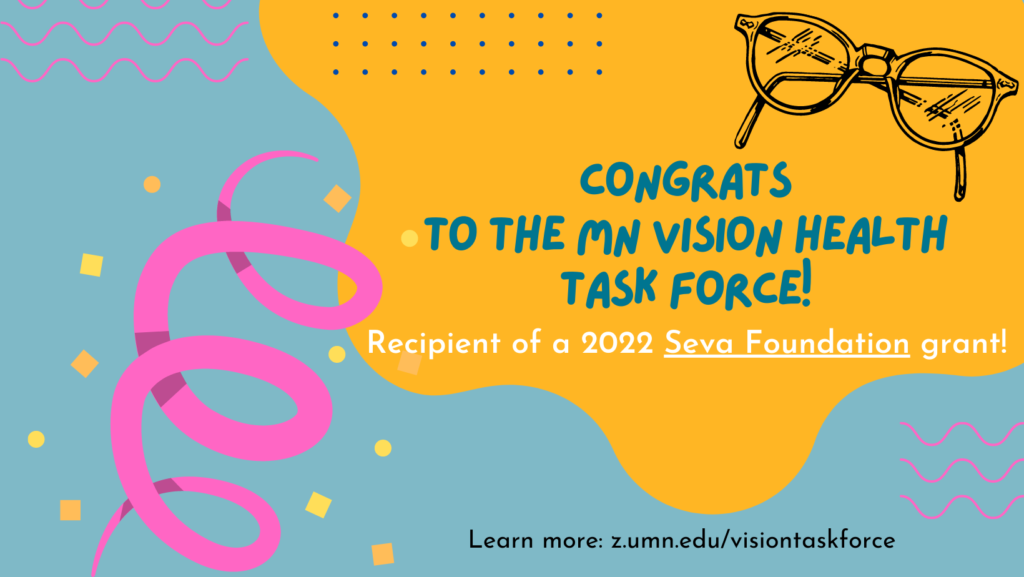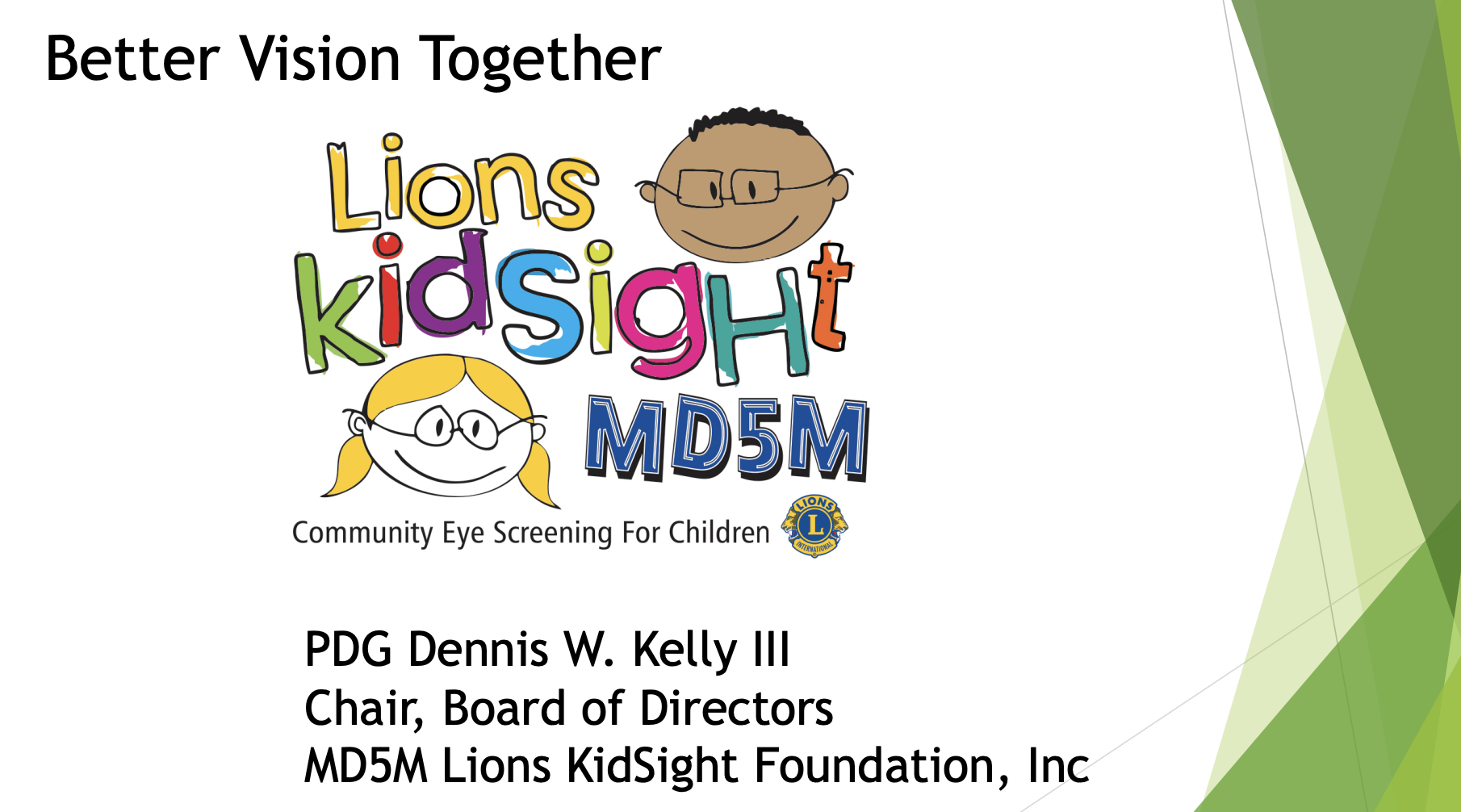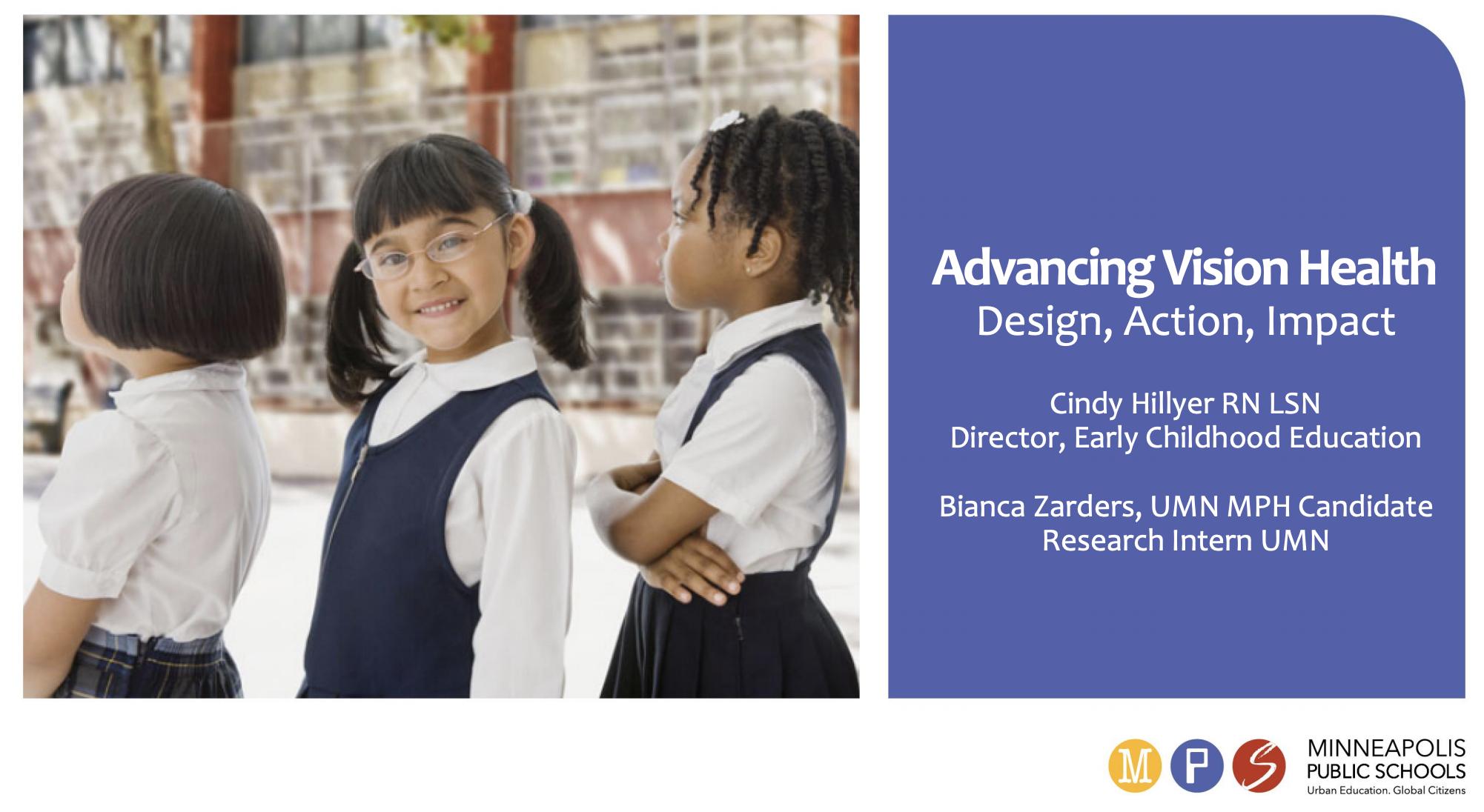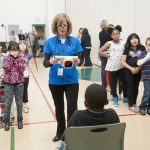Background
The Minnesota Vision Health Task Force works to build a comprehensive system of eye care and improve vision and eye health in Minnesota through changes in policy and practice.
The Task Force is made up of eleven partners focused on improving vision health outcomes of underserved populations of young children. Partner organizations represent philanthropy, non-profit, local, state and federal jurisdictions and higher education. Minneapolis Public Schools Early Childhood leads the Task Force and a robust partnership network of 139 community organizations from health, education and social service sectors that serve young children and their families.
Our Minnesota team was one of eight selected to participate in a 2020-2022 Better Vision Together- Community of Practice, convened by the National Center for Children’s Vision and Eye Health at Prevent Blindness (NCCVEH), and which made advances to the Minnesota and national eye care systems. The NCCVEH supported the Community of Practice to implement actions and solutions anchored in population health strategies through a peer-support approach, including policy change, systems of vision and eye health, public awareness and data collection.
While the Community of Practice time period has ended, the work of the Task Force continues!
The Little Eyes Big Eyes Project: Addressing Unmet Eye Care Needs in Native Communities
In 2022, the Task Force received a Seva Foundation grant that will provide the Task Force with the opportunity to build awareness and expand point of service eye care to Minnesota Native Communities.
Th e Little Eyes Big Eyes (LEBE) Project aims to advance the comprehensive vision health strategy of the Minnesota Vision Health Task Force by equipping primary health clinics and community organizations that serve Minnesota Native Communities to increase vision screening, access to eye care and build awareness of preventive eye care.
e Little Eyes Big Eyes (LEBE) Project aims to advance the comprehensive vision health strategy of the Minnesota Vision Health Task Force by equipping primary health clinics and community organizations that serve Minnesota Native Communities to increase vision screening, access to eye care and build awareness of preventive eye care.
Minnesota is home to eleven federally recognized tribal governments. In 2020, Minnesota Compass reported 68,641 Native Americans live in Minnesota including 7,521 young children and 21,055 Native older adults aged 45-85. The report found that Minnesota Native Communities have higher poverty rates and less access to preventive health care than other people groups in the state.
LEBE will support Native Community capacity, local healthcare clinics and community organizations in vision screening and follow up care by:
- building and sustaining an eye health system of care that will have short- and long-term benefits, positively impacting eye health across the lifespan.
- providing instrument screeners, technical assistance and training (including support in developing care coordination processes and reducing systems barriers to accessing eye care services)
- addressing the vision health of whole families, prioritizing the needs for children and families, and will align strategies of the MD5M Lions Clubs, the Minnesota PMAP health insurers, Federal Head Start Programs and the Minnesota Department of Education Early Childhood Screening Program.
Implementation
The Task Force will engage cultural consultants from Native-led organizational partners across the state to support strategy development for the LEBE awareness campaign and local point of service capacity building. Year one activities will include a metro region initiative, and engagement with north regional and south regional partners for the awareness campaign work and framing the point of service strategies in years two (2023) and three (2024).
organizational partners across the state to support strategy development for the LEBE awareness campaign and local point of service capacity building. Year one activities will include a metro region initiative, and engagement with north regional and south regional partners for the awareness campaign work and framing the point of service strategies in years two (2023) and three (2024).
Seva Foundation grant funding will support the work of Native Community consultants, vision screening instruments, the hosting of vision health fairs (vision screening and eye exams will be offered) capacity-building support for follow-through/care coordination/technical assistance and awareness and outreach materials.
Our learnings from points of service and our awareness campaign will increase understanding of gaps and barriers to eye care in rural and urban tribal communities that will inform state level needs.
Organizational Members
The team is led by Minneapolis Public Schools, Office of Early Childhood Education.
- American Academy of Pediatrics
- Center for Leadership Education in Maternal Child Public Health, University of Minnesota-Twin Cities
- Parents in Community Action: Head Start and Early Head Start
- Children’s Minnesota
- City of Minneapolis Health Department
- City of Minneapolis Youth Coordinating Board
- Early Youth Eyecare (E.Y.E.) and Kirby Puckett Eye Mobile • Phillips Eye Institute, part of Allina Health
- Hennepin County Public Health Family Services
- MD5M Lions KidSight Foundation, Inc
- Minneapolis Public Schools, Office of Early Childhood Education
- Minnesota Department of Education (MDE), Early Childhood Screening (ECS)
- Minnesota Department of Health (MDH), Child and Teen Checkups (EPSDT)
Our Work
Promoting Equity in Children’s Vision Health
Our work was featured in the Department of Education Office of Early Learning’s Office of Special Education and Rehabilitative Services “Voices From the Field Blog: Interview with Cindy Hillyer.“
Advancing Minnesota’s Vision Health: Design, Action & Impact
Learn more about our work in this presentation shared at the 2019 NCCVEH annual meeting in Baltimore.
Lions Club KidSight USA
This presentation provides background on KidSight, a national coalition that screens preschool and school-age kids.

